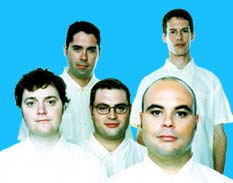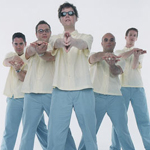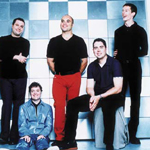Older, Hairier, and Fatter, the Barenaked Ladies Return
By GARY GRAFF, CDNOW Contributing Writer, CDNOW, October 28th, 2000. The Barenaked Ladies talk about meeting Brian Wilson, facing down illness, and why they think recording naked is a good idea.
The Barenaked Ladies talk about meeting Brian Wilson, facing down illness, and why they think recording naked is a good idea.
After kicking around for the better part of a decade singing about million-dollar promises and Brian Wilson reposes, Barenaked Ladies scored big with 1998's Stunt, a quadruple-platinum smash that housed the hit singles "One Week" and "It's All Been Done."
Though tempered by the turmoil of keyboardist Kevin Hearn's battle against cancer (which is currently in remission), Stunt brought BNL's stature around the world to the levels the group enjoyed in its homeland of Canada and in select U.S. border towns. The key to maintaining all of this, of course, was to prove that Stunt was no stunt — which is where Maroon comes in.
 Recorded earlier this year in Los Angeles and produced by Don Was, it's the richest sounding of the group's six albums. It's also a collection of intricately arranged soundscapes that retains the group's soaring harmonies, wry humor, and engagingly smart lyrical twists and turns. And, thanks to another hit ("Pinch Me'') and a Billboard chart debut at No. 5, it's proving that BNL's success was indeed no fluke.
Recorded earlier this year in Los Angeles and produced by Don Was, it's the richest sounding of the group's six albums. It's also a collection of intricately arranged soundscapes that retains the group's soaring harmonies, wry humor, and engagingly smart lyrical twists and turns. And, thanks to another hit ("Pinch Me'') and a Billboard chart debut at No. 5, it's proving that BNL's success was indeed no fluke.
"It's the perfect time of year," singer-guitarist Ed Robertson sings at the start of "Pinch Me," and it's clear that this is still truly the season of Barenaked Ladies.
Did you feel much pressure in following up Stunt's success?
Ed Robertson: For me, the series of successes we've had have been a series of confidence boosts. I believe in what we do, and we have always done what we do in an honest way and in a natural way, and when it works you go, "OK, I don't have to second-guess myself. If I like it, it's good, and I'm not gonna worry about it."
If people gravitate towards it or they don't, I can't pursue that. I just have to make the music that I make, and the success of Stunt gave us the confidence to do that. I think people like when a band changes and pushes the boundaries, and takes a risk, and what worked [on Stunt] was changing and growing, and trying to write the best songs we could.
Jim Creeggan: We sort of kept an even pace going. We haven't had a lot of down time to second-guess ourselves, in a way. We kind of went into this record pretty full, not too far away from touring the last album. So there wasn't a lot of down time to be second-guessing.
What was it like for you, Kevin, to watch Stunt's success from the outside?
Kevin Hearn: I felt great, 'cause I had been involved in creating it, but I also felt like I was watching the kids in the schoolyard from the window. I was literally in a [hospital] room I couldn't leave from June till August [1998], and that's when the record went to No. 1. At the time I even said to the guys that it felt like a cruel joke to me; we worked hard for years, and just when things start going well...
Robertson: It's amazing to have him back, and what he's been through — and, vicariously, what we've all been through — is pretty rewarding.
Creeggan: One thing that really painted [Maroon] was Kevin; in the bed tracks, he had five or six different things set up, and he played them all, just sort of experimenting with different sounds. That coloring that he added is very diverse, and we kept a lot of the initial takes.
How did "Pinch Me'' come about?
Robertson: "Pinch Me" was, I think, the last song to be written for the record. I wrote it up on the third floor of my house, just feeling a bit melancholy; sometimes you look around, and things are great, and you just kind of feel down, and there's no reason for you to — you have an inability to appreciate your surroundings sometimes. That's what I was trying to get at, some of the boredom of pristine suburbia and the potential lying under every yawn.
I had a basic framework in mind, but couldn't finish it off, really. It was a hard one to write, because of the sort of quick singing/rapping; I was so scared people were gonna go, "Oh, it's like 'One Week,'" which it isn't. But I was so paranoid people would think that that I almost didn't write it.
So then you go and make it the first single.
Robertson: Not us; the record company was like, "Oh, this is gonna be the first single," and we were going "Uh-uh, no. We don't want that to be the first single 'cause we don't want people to think we're doing 'One Week' again." And they were like, "Are you insane? We didn't even consider 'One Week.' We love this song." So we were pretty nervous about that song, but I love it. I love singing it.
How did Don Was come to be involved with the album?
Robertson: His enthusiasm for the project, basically. The record company was pretty keen on having a "world-class" producer involved with this record; I have to admit I kinda got my back up about that — "What do we need a 'world class' producer for? We've been doing fine so far." So we sent out tapes to new people. We didn't have new songs yet, so we sent them some of our old songs, and everyone sent them back and said "Let's hear some new songs." But Don said, "I want to meet with these guys."
Don flew to San Francisco to catch a show, and we had dinner with him. He came back after the show and came downstairs, and he was like, "Guys, I get it. I know what you're doing, and it's fucking great. There's humor, but it's not slapstick; it's poignant, it's romantic, you guys are smart, you're great players. It's a great fucking band."
He said, "I don't need to hear new songs; whatever you guys are doing next, I want to be involved." With that kind of enthusiasm and confidence, and respect for what we do, and understanding of it, we very quickly said, "Don Was is doing the record."
 Why Maroon as the album title?
Why Maroon as the album title?
Creeggan: I think we're playing with a couple of meanings there; it's mainly the color, I suppose, but maroon also has that stranded on an island kind of thing. There was also this great poem from a book of poems about colors by these guys [Ken Nordine and Richard Stuart Campbell] that we love and put in the CD booklet.
In a lot of ways, the essence of the writing on this album has this sort of sense of being in a world that is crazy and sort of having an objective view, and also maybe a joke here and there, and maybe Maroon is sort of indicative of that metaphor — being separated, sort of being separated, but still viewing everything around you.
Is there really a song on the album that was recorded while you were naked in the studio?
Robertson: Of course; we've done it since we did Gordon. I can't tell you which one, but on every record, it's the one with the most retarded energy. And it always freaks out everybody in the studio. The first time we did it, we talked everybody into it, so our producer and the engineer, everybody got naked. We've tried to do it subsequently, and people are becoming less and less willing, as we get older and fatter and hairier, to join in the fun.
When we did the track on this record, we came in to listen to the playback, all naked, and Don and Jim [Scott], and the other engineer were all sitting there with duct tape over their eyes. It was hysterical.
You got to meet Brian Wilson during the Maroon sessions, too. What was it like to meet him and to hear his version of your [song] "Brian Wilson"?
Robertson: It was very exciting, very post-modern. Don Was warned us he was coming by, but, still, there's no way to prepare for it. I just kind of assumed it would never enter his sphere of awareness; that song was written in '88, '89, when we were this tiny band in Toronto and thought that Brian Wilson would never, ever hear our music. It was just very bizarre to have Brian Wilson drop by the studio and play you his version of your song. He looked up at me afterwards and said, "Is it cool?" I did not know how to answer him; "Yeah." I mean, it was amazing.
